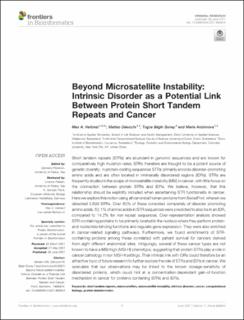Please use this identifier to cite or link to this item:
https://doi.org/10.21256/zhaw-22627| Publication type: | Article in scientific journal |
| Type of review: | Peer review (publication) |
| Title: | Beyond microsatellite instability : intrinsic disorder as a potential link between protein short tandem repeats and cancer |
| Authors: | Verbiest, Max Delucchi, Matteo Bilgin Sonay, Tugce Anisimova, Maria |
| et. al: | No |
| DOI: | 10.3389/fbinf.2021.685844 10.21256/zhaw-22627 |
| Published in: | Frontiers in Bioinformatics |
| Volume(Issue): | 1 |
| Issue: | 685844 |
| Issue Date: | 8-Jun-2021 |
| Publisher / Ed. Institution: | Frontiers Research Foundation |
| ISSN: | 2673-7647 |
| Language: | English |
| Subjects: | Short tandem repeats; Microsatellites; Microsatellite instability; Intrinsic disorder; Cancer; Computational biology; Protein bioinformatics |
| Subject (DDC): | 572: Biochemistry |
| Abstract: | Short tandem repeats (STRs) are abundant in genomic sequences and are known for comparatively high mutation rates; STRs therefore are thought to be a potent source of genetic diversity. In protein-coding sequences STRs primarily encode disorder-promoting amino acids and are often located in intrinsically disordered regions (IDRs). STRs are frequently studied in the scope of microsatellite instability (MSI) in cancer, with little focus on the connection between protein STRs and IDRs. We believe, however, that this relationship should be explicitly included when ascertaining STR functionality in cancer. Here we explore this notion using all canonical human proteins from SwissProt, wherein we detected 3,699 STRs. Over 80% of these consisted completely of disorder promoting amino acids. 62.1% of amino acids in STR sequences were predicted to also be in an IDR, compared to 14.2% for non-repeat sequences. Over-representation analysis showed STR-containing proteins to be primarily located in the nucleus where they perform protein- and nucleotide-binding functions and regulate gene expression. They were also enriched in cancer-related signaling pathways. Furthermore, we found enrichments of STR-containing proteins among those correlated with patient survival for cancers derived from eight different anatomical sites. Intriguingly, several of these cancer types are not known to have a MSI-high (MSI-H) phenotype, suggesting that protein STRs play a role in cancer pathology in non MSI-H settings. Their intrinsic link with IDRs could therefore be an attractive topic of future research to further explore the role of STRs and IDRs in cancer. We speculate that our observations may be linked to the known dosage-sensitivity of disordered proteins, which could hint at a concentration-dependent gain-of-function mechanism in cancer for proteins containing STRs and IDRs. |
| URI: | https://digitalcollection.zhaw.ch/handle/11475/22627 |
| Fulltext version: | Published version |
| License (according to publishing contract): | CC BY 4.0: Attribution 4.0 International |
| Departement: | Life Sciences and Facility Management |
| Organisational Unit: | Institute of Computational Life Sciences (ICLS) |
| Published as part of the ZHAW project: | Trans-omic approach to colorectal cancer: an integrative computational and clinical perspective |
| Appears in collections: | Publikationen Life Sciences und Facility Management |
Files in This Item:
| File | Description | Size | Format | |
|---|---|---|---|---|
| 2021_Verbiest-etal_Intrinsic-disorder-link-protein-STR-and-cancer.pdf | 2.28 MB | Adobe PDF |  View/Open |
Show full item record
Verbiest, M., Delucchi, M., Bilgin Sonay, T., & Anisimova, M. (2021). Beyond microsatellite instability : intrinsic disorder as a potential link between protein short tandem repeats and cancer. Frontiers in Bioinformatics, 1(685844). https://doi.org/10.3389/fbinf.2021.685844
Verbiest, M. et al. (2021) ‘Beyond microsatellite instability : intrinsic disorder as a potential link between protein short tandem repeats and cancer’, Frontiers in Bioinformatics, 1(685844). Available at: https://doi.org/10.3389/fbinf.2021.685844.
M. Verbiest, M. Delucchi, T. Bilgin Sonay, and M. Anisimova, “Beyond microsatellite instability : intrinsic disorder as a potential link between protein short tandem repeats and cancer,” Frontiers in Bioinformatics, vol. 1, no. 685844, Jun. 2021, doi: 10.3389/fbinf.2021.685844.
VERBIEST, Max, Matteo DELUCCHI, Tugce BILGIN SONAY und Maria ANISIMOVA, 2021. Beyond microsatellite instability : intrinsic disorder as a potential link between protein short tandem repeats and cancer. Frontiers in Bioinformatics. 8 Juni 2021. Bd. 1, Nr. 685844. DOI 10.3389/fbinf.2021.685844
Verbiest, Max, Matteo Delucchi, Tugce Bilgin Sonay, and Maria Anisimova. 2021. “Beyond Microsatellite Instability : Intrinsic Disorder as a Potential Link between Protein Short Tandem Repeats and Cancer.” Frontiers in Bioinformatics 1 (685844). https://doi.org/10.3389/fbinf.2021.685844.
Verbiest, Max, et al. “Beyond Microsatellite Instability : Intrinsic Disorder as a Potential Link between Protein Short Tandem Repeats and Cancer.” Frontiers in Bioinformatics, vol. 1, no. 685844, June 2021, https://doi.org/10.3389/fbinf.2021.685844.
Items in DSpace are protected by copyright, with all rights reserved, unless otherwise indicated.